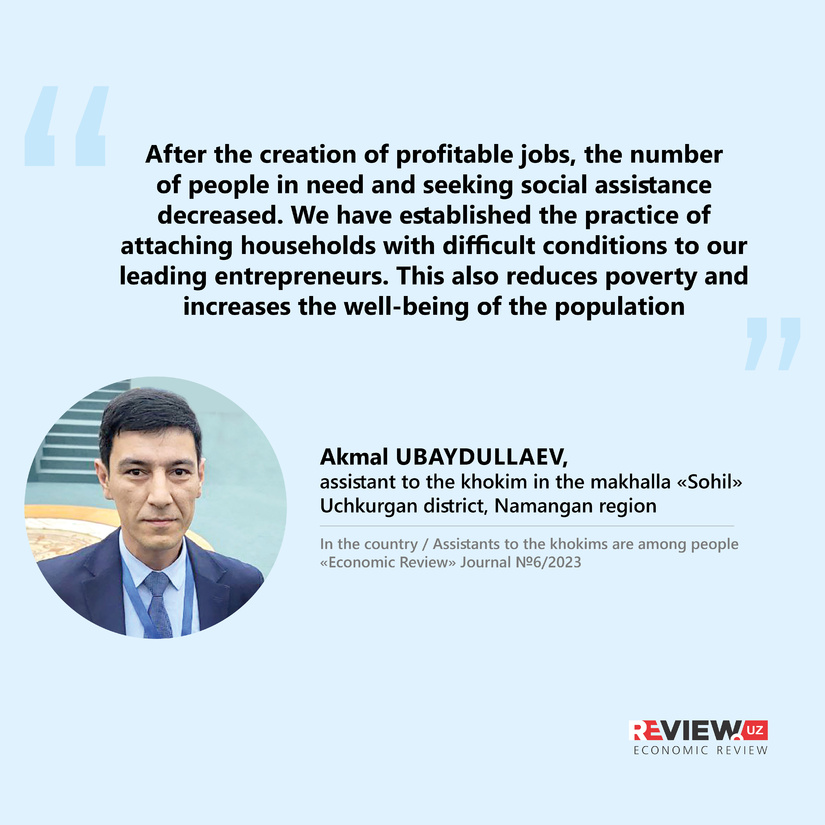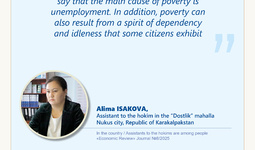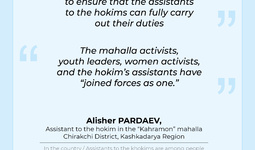— Tell us briefly about the essence of the position of the assistant to the khokim in the makhalla where you work, and about yourself.
— Before I got this position, I worked as an inspector in the Tax Administration of the Uchkurgan district of Namangan region. I am familiar with the life of the people. My previous work experience was also useful in my work as an assistant to the khokim.
If we talk about the essence of the work, then my main activity is to support the residents of the makhalla in every possible way, to help them in establishing business activities, identifying points of growth of the makhalla, overcoming poverty. In this direction, we are working together with the gathering of citizens of the makhalla and other officials at the district level.
Our makhalla borders with the Republic of Kyrgyzstan and has an area of more than 102.2 hectares. The number of houses in the makhalla is 1,017, the population is 4,905 people. As for the infrastructure, there are basically no schools, kindergartens and medical centers. The population is engaged in agriculture, in particular, greenhouses. Animal husbandry is also well developed.
— How did you get started? What did you pay attention to in the development of makhalla?
— I started my activity with a census and a survey of makhalla families in order to study the socio-economic situation and identify the problems of the population. As a result of the study, it was revealed that such issues as the involvement of the population in entrepreneurial activity, taking into account the opportunities available in the makhalla, providing citizens with jobs and a permanent source of income, the development of various types of business on the territory, are relevant.
It also turned out that the residents of the makhalla are interested in fish farming, but for this they need the necessary practical support. Citizens' lack of experience in this area in the past prevented them from doing this work. Our makhalla is located on the bank of the Naryn River, therefore, after consulting with responsible persons, residents, specialists, as well as based on the available opportunities, we identified fish farming as the "driver" of the economic growth of the makhalla. Naturally, we proceeded from the interest of the residents of the makhalla and the climatic conditions.
— What was done after the makhalla's "driver" was determined? How was the work organized?
— At first, experienced specialists in fish farming from the Jalal-Abad region of Kyrgyzstan were involved for consultations and it was decided to organize the work by the method of cooperation. A fish farming cooperative consisting of 100 families was established. Concrete fish ponds were constructed along the edges of the inner irrigation ditches used for irrigation. For this, citizens were allocated preferential loans for three years, one year of which is a grace period. A citizen who has received a loan within the framework of cooperation is allocated a separate pond for growing fish. 600 kg of feed for 6 months and the necessary consulting support were also provided. Another advantage of cooperation is that monthly interest (400 thousand sums) the loan is paid by the cooperative in order to help an unemployed citizen who has received a loan. Therefore, there are no cases of late payment on a loan in the makhalla.
The establishment of fish farming had other economic advantages. For example, after the irrigation ditches were handed over to entrepreneurs, they were repaired and concreted, as a result of which water seepage and evaporation decreased. Because in the past, our internal irrigation ditches used for irrigation of fields led to large losses of water. In addition, the water used for fish farming is also used in agriculture, because it contains useful substances. It is also a great benefit for the population engaged in agriculture.
At present, young entrepreneurs in our makhalla have thoroughly studied fish farming and gained their experience in the process of work, even visited other places and studied best practices in fish farming. In turn, they are now teaching what they know to their mahallans who have just started activities in this direction. Everyone benefits from this.
— Transport, energy, utilities, and social infrastructure are important for improving the welfare of the makhalla. What has been done in this regard in your makhalla?
— Indeed, the state of infrastructure plays an important role in the standard of living of the population. The makhalla is provided with drinking water and natural gas. The development of entrepreneurship has significantly improved the infrastructure of mahali. In particular, 5.5 km of roads have been paved over the past short time. Modern concrete power transmission poles have been installed on the streets of the makhalla. Also, in order to improve the power supply at the expense of the state, 2 old transformers were replaced with new ones. It is important to note that the successful development of fish farming has allowed the development of the service sector in the makhalla.
— Currently, the fight against poverty is one of the priorities of our country's social policy. What are the main causes of poverty identified among the population of the makhalla and what has been done to eliminate it?
— Based on research and analysis, as well as personal experience, we can say that most cases of poverty among the population are caused by the inability of citizens to sufficiently use their profession or skills in market conditions, lack of funds or knowledge to start a business. In order to reduce the level of poverty and lift the population out of poverty, we have sent 47 citizens living in makhalla to monocenters for training in various sought-after professions. Also, 17 citizens received a sewing machine, a motor cultivator and ovens on the basis of a subsidy. According to the Decree of the President, another 24 citizens have been allocated 20 acres of land for the establishment of agriculture. At present, citizens who have received land are engaged in planting crops and replenishing the family budget.
As our President said, if we create profitable jobs, poverty will decrease dramatically. This has been proven in practice. In fact, after the creation of profitable jobs, the number of people in need and seeking social assistance has decreased. In addition, we have established the practice of attaching households with difficult conditions to our leading entrepreneurs. Leading entrepreneurs not only provide them with financial support, but also take them as students, teach them their business and pay them a monthly salary for their work. This also reduces poverty and increases the well-being of the population.
— In our country, there is a tough fight against any manifestations of corruption. What are you doing to prevent corruption in your activities?
— Of course, it is very important to avoid corruption in our activities. Because corruption overshadows our good deeds. Most of the activities of the assistants to the khokim are carried out through a transparent electronic system. For example, subsidies, loan allocation, social assistance issues, etc. We also try to build our activities on the principles of transparency and openness. In addition, we report on the work carried out and their results to the residents of the makhalla, deputies, higher organizations, officials. All this serves to prevent corruption.
— What has changed in the makhalla over the past year and a half, has confidence in the institute of the assistants to the khokim and the makhallabay system as a whole grown?
— I can say with confidence that the work carried out on the development of entrepreneurship has had a positive impact on the well-being of the residents of the makhalla, the financial condition of citizens who have successfully started entrepreneurial activity has improved, their confidence in themselves and the future has grown. During my activity, I feel the support of the residents of the makhalla. The main thing is that people have faith in reforms and their future. This is the most important thing.
— What are your plans for the future?
— Taking into account the success of the trout breeding project and the existence of demand from the population, ponds for another 600 families are being built in the makhalla. In addition, we have started exporting rare trout to Russia. If the annual potential of fish cultivation in the Uchkurgan district was 1000 tons, then this year we plan to increase this figure by 10 times. As a result of the study, it turned out that many citizens living in the mahalla have a desire to develop ecotourism. The current task is to comprehensively support this direction as well.
— Thank you for your sincere answers.
Jamoliddin Turdimov, CERR
"Economic Review" Journal №6/2023





















leave a comment